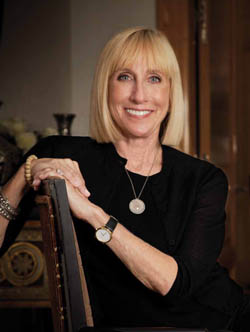Realizing Her Potential by Helping Others
TC alumna Jill Iscol believes that young people are rediscovering a calling in public service
In 1970, as a Teachers College student, Jill Iscol (Ed.D., 1977; M.A. 1968) taught at the Agnes Russell School 120th Street
and Broadway.
and Broadway.
“It brought together kids of TC professors with kids from the custodial staff,” recalls Iscol, a thoughtful philanthropist recently appointed by New York Governor David Paterson to a new state Commission on National and Community Service. “The teachers and parents worked to help kids reach their potential and also function as members of a community. I think that tension—of individual potential versus the common good—is fundamental in American life. Playing it out with school leaders who really get it should be built into every school.”
That same tension has animated Iscol’s own career and—she believes—is now motivating a younger generation.
“There’s something truly different happening in society,” she says. “The current generation of 21- to 35-year-olds is coalescing around public-spirited work. [New York Times columnist] David Brooks has called them the Odyssey Generation—people like Jacqueline Novogratz [creator of the Acumen Fund, which takes an entrepreneurial approach to combating poverty], Michelle Rhee [superintendent of Washington, D.C. public schools], Sarah Horowitz [founder of Working Today, a union representing the nation’s growing independent work force], Jimmie Briggs [founder of ManUp, a global movement to end gender-based violence] and Diahann Billings-Burford [a former lawyer who is New York City’s Chief Service Officer, leading a citywide initiative to promote volunteerism]. They believe in creating public-private partnerships, and they don’t see their work as noblesse oblige or traditional charity, but instead as investment in improving society.”
Iscol traces this development to two events during the Clinton-Gore years: the first-ever White House Conference on Philanthropy, held in 1999, to which she contributed, and the annual Gore Family Reunion Conference, aimed at strengthening American family life, which she chaired from 1997 to 2000.
“I met so many brilliant and talented people,” she says. “They could have done anything they wanted, but they were searching for more meaningful lives.”
It was a moment of truth for Iscol, who had earned degrees at both TC and Yale, but doubted—despite having taught at Bank Street College and served as interim co-director of TC’s pre-service teacher education program—whether academia was her true métier.
“Other things were happening,” she says, “including that my husband [Kenneth Iscol, a telecommunications executive] and I set up a private foundation, and I decided to take the whole notion of strategic philanthropy very seriously.”
The Iscols launched the Leadership Development Program for Public Service at Cornell University , and Jill Iscol later co-founded City Year New York, a young adult service corps currently combating the drop-out rate in New York City
Nowadays, Iscol is gearing up to serve on Governor Paterson’s new commission and mulling a possible book on public service. She’s also excited about Teachers College, where she has endowed scholarships and policy events and serves on the President’s Advisory Council.
“President Fuhrman has an intelligence that’s not only intellectual but rooted in the confidence to go forward with very specific projects, like the launching of a new public school and partnering with the city’s Department of Education,” she says. “Bill Clinton talks about the importance of the ‘hows’ of affecting change, not only the ‘whats’, and Susan gets that. She’s facing big challenges, but if I were a betting woman, I’d bet on her and TC.”
With friends of the college like Iscol, it seems like money well placed.
Published Friday, Dec. 4, 2009
